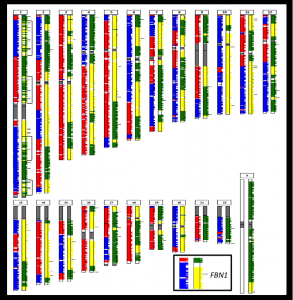The Griffin lab in collaboration with the Bridge Centre (part of the London Women’s Clinic Group), the Universities of Cambridge and Oxford and the company Illumina Inc have taken a step closer to the full implementation of a universal test for the diagnosis of genetic disease in human embryos. The first paper (Natesan et al 2014) published in the Journal RBM Online described the clinical application of the approach (known as “Karyomapping”) for the detection of both gross genomic (chromosomal) abnormalities and the disease “Smith-Lemli-Opitz (SLO) syndrome.” SLO is a debilitating disease that affects many parts of the body e.g. a small head size, intellectual impairment, malformations of the heart, lungs, kidneys, gastrointestinal tract, and genitalia are also common. SLO infants typically also have a weak muscle tone, problems with feeding, slow growth, fused toes and extra fingers. Current diagnostic methods have the drawback of time and cost related concerns associated with tailoring a specific test for each couple and/or disorder. The family in question underwent IVF followed by Karyomapping, which was used to confirm “gold standard” approaches for the detection of genetic disorders.
Karyomapping, unlike the standard approaches performed alongside it, required no a priori test development. A singleton pregnancy and live birth, unaffected with SLO syndrome and with no chromosome abnormality arose. The study demonstrated that Karyomapping is potentially capable of detecting a wide spectrum of disorders. The second study (Thornhill et al. 2015) published in the Journal of Assisted Reproduction and Genetics established that Karyomapping could be used for the detection of Marfan Syndrome. This disease has far more variable features than SLO but can include enlargement of the aorta (which can cause a range of clinical problems and be life threatening) as well as problems with the connective tissue in the heart, lungs and skin. In this case, a couple, where the male partner was affected by Marfan syndrome underwent IVF and Karyomapping which, again, was used to confirm the gold-standard approaches in a clinical setting. A twin pregnancy ensued and neither children were affected with the disease – sadly however one of the babies died just after birth on an infection (which was unrelated to the procedure). The surviving twin however is fit and healthy. The manuscript features on the front page of the journal and was co-authored by University of Kent honorary staff Alan Handyside, Michael Summers and Alan Thornhill, recent PhD graduate Gary Harton and PhD student Christian Ottolini. Senior author on both papers Professor Darren Griffin said “I’m delighted to see these two papers published. They demonstrate the power and wide applicability of Karyomapping
Natesan SA, Handyside AH, Thornhill AR, Ottolini CS, Sage K, Summers MC, Konstantinidis M, Wells D, Griffin DK. Live birth after PGD with confirmation by a comprehensive approach (karyomapping) for simultaneous detection of monogenic and chromosomal disorders. Reprod Biomed Online. 2014 Nov;29(5):600-5. doi: 10.1016/j.rbmo.2014.07.007.
Thornhill AR, Handyside AH, Ottolini C, Natesan SA, Taylor J, Sage K, Harton G, Cliffe K, Affara N, Konstantinidis M, Wells D, Griffin DK. Karyomapping-a comprehensive means of simultaneous monogenic and cytogenetic PGD: comparison with standard approaches in real time for Marfan syndrome. J Assist Reprod Genet. 2015 Mar;32(3):347-56. doi: 10.1007/s10815-014-0405-y.
